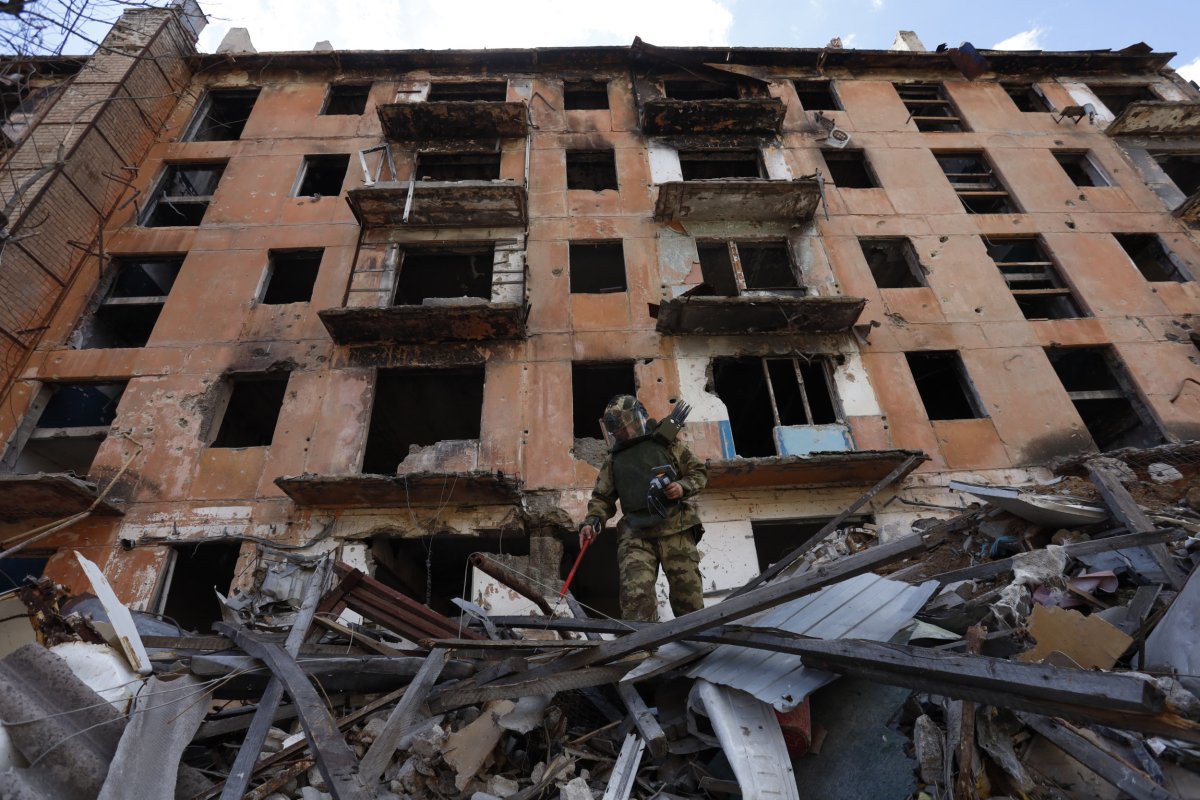Two international bodies have on the same day accused Russia of carrying out war crimes and human rights violations in Ukraine.
The International Criminal Court (ICC) pretrial Chamber said on Tuesday it had issued arrest warrants for former Russian Defense Minister Sergei Shoigu and Chief of the Russian Army General Valery Gerasimov for “the war crime of directing attacks at civilian objects” in Ukraine.
On the same day, the European Court of Human Rights (ECHR) Grand Chamber said Moscow had committed human rights violations in Crimea in the decade since the beginning of its illegal occupation of the peninsula in February 2014.
Meanwhile, a lawyer for an international human rights group whose report this month outlined how Putin’s forces had employed starvation tactics during the siege of the southern city of Mariupol in 2022, told Newsweek that “food and objects indispensable to survival are being weaponized across the conflict” by Russia.

Russian president Vladimir Putin on June 20, 2024, in Moscow. On June 25, 2024, two international bodies accused Russia of human rights violations and war crimes in Ukraine.
Russian president Vladimir Putin on June 20, 2024, in Moscow. On June 25, 2024, two international bodies accused Russia of human rights violations and war crimes in Ukraine.
Getty Images
In its statement released Tuesday, ICC judges said there were grounds that the suspects were responsible for missile strikes carried out against the Ukrainian electric infrastructure “from at least 10 October 2022 until at least 9 March 2023.”
Newsweek has contacted the Kremlin and the Russian defense ministry for comment on the decisions by both bodies. Russia’s Security Council, which Shoigu now heads, called the ICC arrest warrants “hot air” since the court’s jurisdiction did not cover Russia and “part of the West’s hybrid war” against Russia.
The ICC report was damning in its criticism of Shoigu and Gerasimov, accusing them of causing incidental harm to civilians and damage to civilian objects and inhumane acts.
These are violations of the Rome Statute that established the court in the Hague that relies on its 124 members to arrest anyone under a warrant.
It is the latest war crimes accusation linked to Putin and his inner circle. In March, 2023, the ICC issued an arrest warrant for Putin over the alleged abduction of children from Ukraine, a claim which Moscow has dismissed.

A Russian sapper checks a ruined building in Mariupol, in Russian-controlled Ukraine. A report in June says Russian forces employed starvation tactics in their 2022 siege of the southern port city.
A Russian sapper checks a ruined building in Mariupol, in Russian-controlled Ukraine. A report in June says Russian forces employed starvation tactics in their 2022 siege of the southern port city.
Getty Images
Siege of Mariupol
This month, the group Global Rights Compliance (GRC) released a report which it said proved that Russian forces had starved Ukrainians in the southern city of Mariupol in the siege that lasted until May 20, 2022.
Drawing on satellite imagery, pictures, videos, public statements and digital data, the group concluded that Russian forces had targeted water, food and medical supplies in a deliberate tactic of starvation before they seized the port city.
It found that 450,000 civilians were targeted with all water, electricity and gas supply cut off. Ukrainians were forced to drink from puddles, radiator batteries, and melted snow, while food distribution points, medical facilities and humanitarian corridors were bombed.
“What is the most shocking is the findings showed the strategy Russian forces pursued in starving the civilian population as a means to accelerate the capitulation of Mariupol,” said Naomi Prodeau, report’s co-author and lawyer on the GRC’s starvation mobile justice team.
“Attacks on civilian populations, attacks on civilian objects, attacks on hospitals—some of those constitute attacks on objects indispensable to the survival of civilians,” she told Newsweek.
She said that such tactics were employed in other sieges by pro-Russian forces prior to Mariupol, such as in Aleppo, where Moscow intervened in the Syrian civil war, “so there were prior instances of these tactics before Mariupol.”
“There are strong indicators that Russian and pro-Russian forces employed similar siege tactics and starvation tactics in northeastern regions at approximately the same time as the siege of Mariupol,” she said. “It demonstrates that this is a tactic that is regularly employed and deployed against Ukrainian civilians.”
“Food and objects indispensable to survival are being weaponized across the conflict beyond siege tactics,” she added.
The ECHR Grand Chamber said on Tuesday that since 2014 when Putin seized Crimea, Russia had committed human rights violations on the peninsula, including the ill-treatment of Ukrainian soldiers, persons of Ukrainian ethnic origin, journalists and members of the Turkic Crimean Tatar minority.
After its full scale invasion in 2022, Russia was expelled from the Council of Europe, of which the ECHR is part and its ruling was welcomed by the Ukrainian foreign ministry which called it a “crucial milestone.”
Meanwhile, the GRC is taking its evidence to the ICC Office of the Prosecutor of the International Criminal Court to build a larger war crimes case against Putin.
Prodeau said that similar to genocide, the crime of starvation requires a specific intent to attack objects indispensable to civilian survival, and specific intent to starve that population, “which is a higher bar.”
“Under that standard, if Russian or pro-Russian forces knew that in the ordinary course of events, civilians would starve, that qualifies as intent,” she said. “There has never been a prosecution for the war crime of starvation before international courts,” she said, “it’s an underappreciated crime and is hard to prove.”
Correction: 6/26/24, 9 a.m. ET: This article was updated to correct the date of the end of the siege of Mariupol to May 20, 2022.
Newsweek is committed to challenging conventional wisdom and finding connections in the search for common ground.
Newsweek is committed to challenging conventional wisdom and finding connections in the search for common ground.
